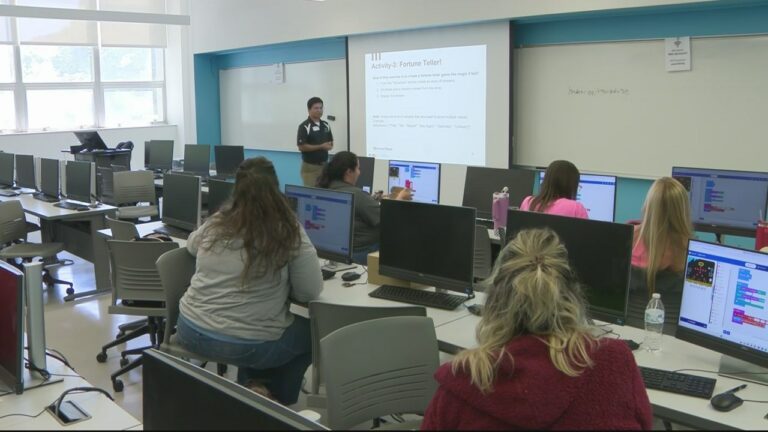SPRINGFIELD, Mo. – It started as an idea several years ago.
Dr. Kelly Franklin said she met professors of physics, computer science and chemistry at Missouri State University who helped her write science grants.
Then she found a way to do something she’d wanted to do for a while: bring the same STEM education available in big cities to rural areas.
“I was familiar with the process and I really wanted Missouri State to fund the grant. This is a rural area that gets overlooked and I knew rural areas are important,” Franklin said. “I come from a rural school background and I’ve been a teacher for 30 years and now I think, ‘What would have happened if we had the funding?’ There is very little funding for rural schools, especially in Missouri. We are at the bottom, the very bottom. $4 million to work with 16 school districts in this region could really make a difference.”
Computer Science Opportunities, Development and Education in Rural Schools, or CODERS, was born.
“CODERS has really helped fill a gap for teachers in rural areas and provide them with coder kits that contain things that teachers might not otherwise have access to, like microprocessors, microbits, cute robots, robot dogs, batteries and even chargers,” Franklin said.
The teachers will attend a three-day course on the MSU campus.
Throughout the school year, they host short events where teachers can take refresher courses, and at some point during the school year, the district will also be able to send students to the Coding Olympiad in Missouri.
Franklin says through research he conducted based on test scores and student surveys, he has seen improvements in education for rural students.
“Over the past year, standardized test scores have increased by 43 percent in science and 10 percent in math,” Franklin said. “Through this training and the work our teachers are doing in the classroom, we’re leveling the playing field in STEM.”
Interested teachers start with the basics in their first year and then return to the program each summer to learn even more, refining what they learned 12 months earlier.
OzarksFirst interviewed three teachers: John Moore from the Neosho School District, Stephanie Fuller from the Exeter School District and Abbie Coy from the Pardee School.
“What I like about our activities is that these lessons use things like force and motion, and can be applied to science lessons. We did science and space exploration with CuteBot in one lesson, and it became a Land Rover,” Moore said. “Students were able to program CuteBot to avoid, overcome and go around obstacles, and kids really got to experience what would actually happen in the real world.”
“[My students] “They’ve taken their coding to the next level, and some students have even started assisting local tech experts at their schools with hardware to maintain student laptops,” Fuller said.
“The big thing I’ve found watching my kids is that kids who weren’t excelling academically have a different way of thinking. Not only does programming help them develop the critical thinking skills they lack, but it also helps them excel at programming by thinking differently,” Coy said. “They’re able to achieve success that they weren’t able to before.”
Franklin says one of the reasons they try to stay ahead of the curve is because educators who take their courses could be preparing students for jobs that haven’t even been created yet.
“The team [the grant several years ago] “Back then, we weren’t talking about artificial intelligence the way we are now,” Franklin said. “I don’t think there would be a TikTok in 2021. Things are changing so quickly.”
Franklin cited TikTok because one of its popular features is the “For You Page,” which curates content for users based on an algorithm designed from previously watched videos.
Coding is key in creating algorithms.
“We broke it down into algorithms and ‘recommendation pages,’ but someone had to do it,” Fuller says. “Someone had to make sure that when your GPS was working, it was working well, because in society, every piece is what makes society more useful.”
Franklin said while local teachers are learning about the future in teaching the present, it also paves the way for career paths for teachers in the district.
“I’m able to raise Ava, work on the family farm, and work remotely for a global company,” Franklin says.
Educators OzarksFirst spoke with said giving up part of their summer vacation could be life-changing for students.
“It gives us the opportunity to grow as educators. What Missouri State gives us is more knowledge as continuous learners,” Moore said. “It also gives us the opportunity to collaborate with colleagues from other school districts, share ideas and thoughts, successes and failures, and grow as a group.”
“This program teaches kids the fundamentals, then a spark is lit and they take off,” Coy said. “Kids who go to rural schools don’t have those opportunities, but now they have the opportunity because this spark was lit.”
“When I see the enthusiasm and desire from students to want to learn more, I’m happy to go and learn and pass on that information,” Fuller said.
Franklin said the current grant will cover one more year of the CODERS program, but they are in the process of obtaining future grant funding to continue the program for years to come.

